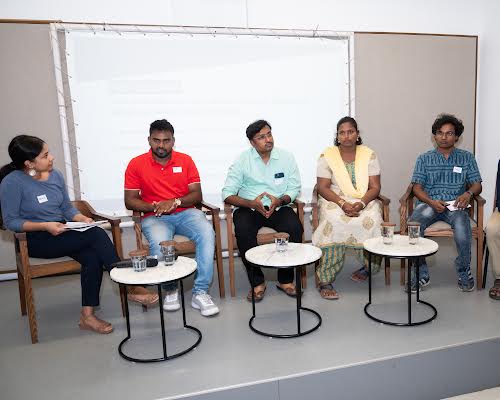Restless Development India (url) organised a Youth Climate Conclave on 14th Jul 2023. This event was organised as a platform for nurturing new ideas, building connections, and encouraging collective action towards making Bangalore inclusive for all. Biome was invited as panelist for the session "How youth-led actions can catalyze community response in addressing climate change challenges"
Event Date : 14th July, 2023
Event Venue : Bangalore International Centre, Domlur
The opening Keynote speaker was Mr. Anand Malligavad of Malligavad Foundation. He spoke about his journey in reviving lakes and the practical challenges he faced. He also said that self belief and persistent efforts are very important in any endeavor, and that the results will take time to show up.
Panel 1 Topic : How youth-led actions can catalyze community response in addressing climate change challenges
Panelists
- Mr Mayur, Youth Climate Champion, Restless Development
- Mr Koushik Dhayal, Youth for Parivartan
- Mr Srinivas, Biome Environmental Trust
- Ms Shalini, community leader from Mahila Housing Trust
Moderator : Ms Parvathi, Restless Development’s Youth Climate Champion
The first panel brought together perspectives from individuals and organizations who are championing action on the ground in tackling some of the key challenges that the city is facing today. The discussion focused on the crucial role that youth-led actions play in enabling community-driven change in the city. The conversation looked at the opportunities and challenges faced by youth-led initiatives in the areas of cleaning up the city, water conservation and low cost housing.
Panel 2 Topic : Facilitating Partnerships & engaging with youth led initiatives - Experiences, impact and learnings
Panelists
- Mr Anirudh Dutt, Founder of Let’s Be The Change
- Ms Pinky Chandran, Independent Journalist
- Ms Vrinda Kapur, Grants Manager at Porticus Foundation
Moderator : Mr Abhishek S, Restless Development Youth Climate Champion
The second panel reiterated the importance of a conducive ecosystem for youth-led change, through the lens of some of the key stakeholders. The discussion was mainly focused around how community level initiatives can be effectively organized through partnerships and what can be learnt from the past experiences. One of the most echoed thoughts was the importance of having persistent belief and working towards the goals, and the time and efforts it takes to convert scalable partnerships. The panelists delved on the criticality of inclusive grant-making that permeates effectively into community action with the right support of advocacy, communication, involvement of decision makers and community champions.





